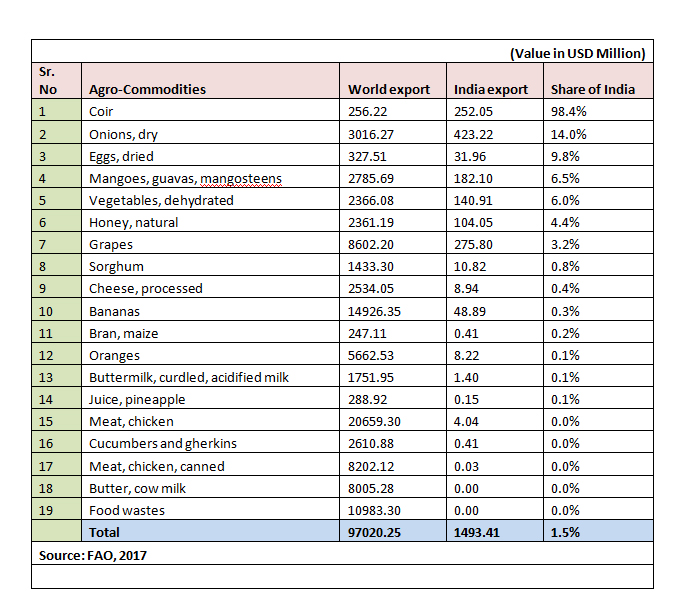Capacity building of women-owned enterprises necessary to unlock this export opportunity, says Ms. Naik
India can explore export opportunities in 19 agro-based commodities that together have a global market of USD 97.6 billion, recent data from the Food and Agriculture Organisation of the United Nations shows. India’s share in the global market for these products currently stands at a miniscule 1.5%, with India exporting USD 1.49 billion worth of these commodities in 2017.
Except for coir and coir products, India does not have significant market share in most of these identified 19 commodities (see the table below). Despite being a major producer, India’s share in exports of bananas, oranges, chicken meat and milk products such as cheese and butter milk is miniscule.
Thus, there is huge unrealized export market for India’s farm commodities, which can be explored by food processing companies and mega food parks that are envisaged under the central government scheme. Government of India is offering financial support to around 40 mega food parks across various parts of the country.
Maharashtra, which is the second largest exporter of agro commodities stands to benefit from this unrealized export opportunity. The state will have three of the 40 mega food parks that are being implemented across the country. These three parks are being set up in Paithan, Satara and Wardha for processing fruits, vegetables, foodgrains and milk.
Of these 19 farm commodities, Maharashtra has been a dominant exporter of only grapes, mangoes, onions and dehydrated vegetables. The state can upgrade its export capability in dairy products, poultry products and cereals such as sorghum and maize.

Commenting on the strategy to enhance exports in this sector, Ms. Rupa Naik, Senior Director, MVIRDC World Trade Center Mumbai said, “We need to work on multiple dimensions to realize this export opportunity and these include frequent exchange of trade missions with the target market, guiding local farmers and food processors on global quality standards and upgrading logistics infrastructure.”
There is also a need to address the emerging challenges of climate risks and price risks in crop production. There is a need to accelerate adoption of climate smart agricultural practices and also an assured price system by popularizing contract farming in the identified crops. Ms. Naik also highlighted the importance of capacity building among women-owned enterprises and farmers to enhance our farm exports. She said, “We need to identify women self help groups working in the field of agro-processing and take a delegation of this group to target markets, train them on quality standards, provide them with trade credit and necessary processing technologies so that they can be globally competitive.”
India can enhance its agro exports through a coordinated action plan with the participation of government, trade support institutions, including quality standards authorities, export promotion councils and entrepreneurs.

 : +91 7718886506
: +91 7718886506